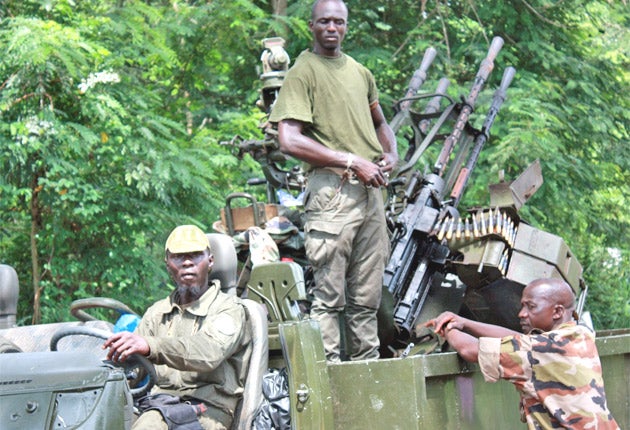Ivory Coast war intensifies as battle for capital looms

Ivory Coast has been plunged back into civil war after a slow-burning election crisis developed into violence with forces loyal to the internationally recognised president-elect, Alassane Ouattara, poised to take the capital.
The fighting threatens to provoke a humanitarian crisis, with civilians seeking refuge in public buildings or fleeing over the border into Liberia.
Laurent Gbagbo, who has defied the international community by refusing to relinquish power, yesterday appealed for a ceasefire. Four months of often violent stalemate ended this week when Mr Ouattara's forces launched a three-pronged offensive. Heavy fighting has flared in some areas while Gbagbo loyalists in the army have withdrawn.
The importance of the expected fall of Yamoussoukro is largely symbolic. The commercial hub of Abidjan, where the presidential rivals are both based, is the capital in all-but name.
More important was the pro-Ouattara's soldiers' advance towards the economically-vital port city of San Pedro, after taking other cities in the area in recent days.
Alex Vines from the Chatham House think-tank said the capture of the port would give Mr Ouattara's supporters a share of the cocoa trade and hobble his opponent. "It would provide them with an income from the cocoa industry and could leave Gbagbo unable to pay the army and civil service," he said.
However, a swift military victory for the rebels remains unlikely, analysts said, as does any prospect of Mr Gbagbo accepting offers of a retreat into exile. "Don't underestimate the Ivorian military and the paramilitary police," said Mr Vines, who warned the regime still has a monopoly on air power.
After 10 years in power Mr Gbagbo, formerly a left-wing professor in Paris, has wealthy backers who stand to lose a fortune if his rival assumes power.
Analysts also point to the influence of the hardline first lady Simone Gbagbo, who is widely reported to dominate her husband and was previously investigated by the UN over alleged involvement in human rights abuses.
Nearly 500 people have been killed since the electoral turmoil in November, but much of the fighting has been limited to Abidjan, which has been carved into warring neighbourhoods.
Mr Ouattara has set up a parallel administration from a besieged hotel in the city, where he is protected by international peacekeepers.
Fears were mounting last night over the fate of as many as 30,000 people at a Catholic mission in Duékoué, in the west of the country. The mission has been overrun by migrant workers fearful of being targeted in the fighting.
"We're hearing the fighting... in front of the church and people are inside the church and they are running around inside," a priest told the BBC.
The humanitarian situation on the border with Liberia was described as "desperate" by aid workers there. As many as 4,700 Ivorian refugees are sharing just 10 pit latrines, said Joe Mansary from the Catholic charity Cafod. Up to 600 people are streaming across the border every day
"The food is running out and there is no clean water. We are facing a humanitarian crisis where children will start dying," said Mr Mansary.
The world's leading cocoa producer has been effectively split between the Muslim-majority north and the predominantly Christian south since an army mutiny in 2002.
A lengthy internationally-sponsored peace effort secured the first presidential election in a decade late last year. But the prospects for peace quickly disappeared as the incumbent used his own appointees in the constitutional court to overturn the outcome.
African Union attempts to mediate in the crisis have foundered on Mr Gbagbo's refusal to accept his poll defeat and take a junior role in a unity government.
The regional bloc ECOWAS has been divided over what action to take over Ivory Coast, with initial threats of military intervention undermined by Ghana's refusal to take part.
Join our commenting forum
Join thought-provoking conversations, follow other Independent readers and see their replies
Comments